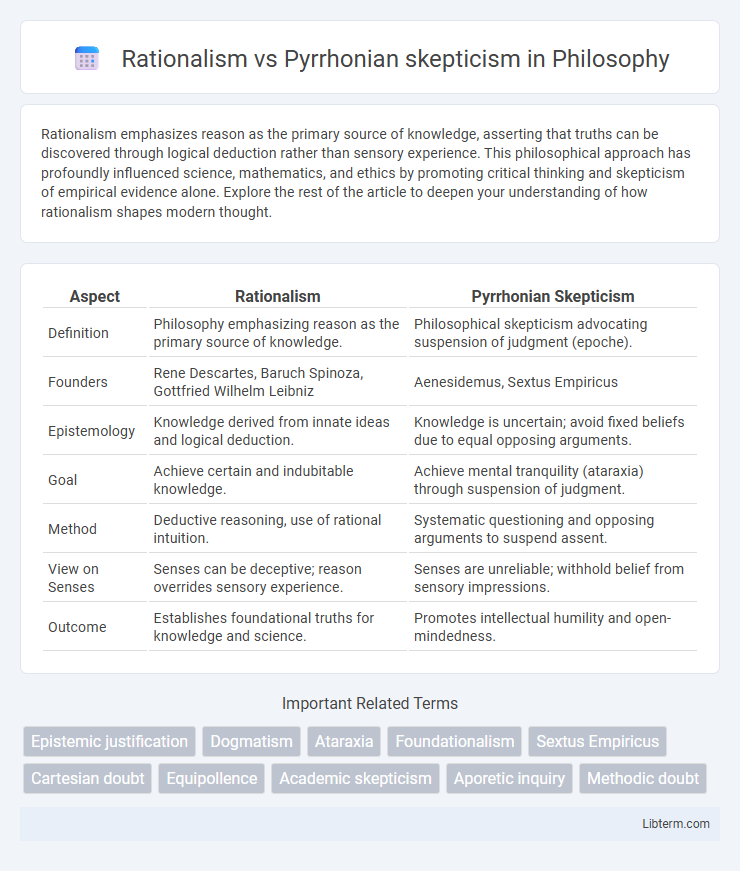Rationalism emphasizes reason as the primary source of knowledge, asserting that truths can be discovered through logical deduction rather than sensory experience. This philosophical approach has profoundly influenced science, mathematics, and ethics by promoting critical thinking and skepticism of empirical evidence alone. Explore the rest of the article to deepen your understanding of how rationalism shapes modern thought.
Table of Comparison
| Aspect | Rationalism | Pyrrhonian Skepticism |
|---|---|---|
| Definition | Philosophy emphasizing reason as the primary source of knowledge. | Philosophical skepticism advocating suspension of judgment (epoche). |
| Founders | Rene Descartes, Baruch Spinoza, Gottfried Wilhelm Leibniz | Aenesidemus, Sextus Empiricus |
| Epistemology | Knowledge derived from innate ideas and logical deduction. | Knowledge is uncertain; avoid fixed beliefs due to equal opposing arguments. |
| Goal | Achieve certain and indubitable knowledge. | Achieve mental tranquility (ataraxia) through suspension of judgment. |
| Method | Deductive reasoning, use of rational intuition. | Systematic questioning and opposing arguments to suspend assent. |
| View on Senses | Senses can be deceptive; reason overrides sensory experience. | Senses are unreliable; withhold belief from sensory impressions. |
| Outcome | Establishes foundational truths for knowledge and science. | Promotes intellectual humility and open-mindedness. |
Introduction to Rationalism and Pyrrhonian Skepticism
Rationalism emphasizes reason as the primary source of knowledge, advocating that certain truths can be known independently of sensory experience through innate ideas and deductive reasoning. Pyrrhonian Skepticism, rooted in the teachings of Sextus Empiricus, promotes suspension of judgment (epoche) by equally weighing opposing arguments to achieve mental tranquility (ataraxia). These contrasting epistemological approaches highlight the debate between confidence in rational knowledge and the systematic doubt that questions the possibility of certain knowledge.
Historical Background and Philosophical Origins
Rationalism, rooted in Ancient Greek philosophy and further developed during the Enlightenment by thinkers like Descartes and Spinoza, emphasizes reason as the primary source of knowledge, asserting that certain truths can be known a priori. Pyrrhonian skepticism, originating from Pyrrho of Elis in the 4th century BCE, advocates for suspension of judgment (epoche) due to the equal weight of opposing arguments, fundamentally questioning the possibility of certain knowledge. These contrasting philosophical origins reflect rationalism's confidence in human reason and Pyrrhonian skepticism's commitment to epistemic humility and continual inquiry.
Core Principles of Rationalism
Rationalism centers on the belief that reason and innate knowledge are the primary sources of understanding, emphasizing deductive logic and intellectual intuition as tools for acquiring truth. It asserts that certain concepts and knowledge exist independently of sensory experience, enabling objective certainty through rational analysis. This contrasts with Pyrrhonian skepticism's rejection of definitive knowledge, highlighting an unwavering confidence in reason as the foundation for epistemic clarity.
Key Tenets of Pyrrhonian Skepticism
Pyrrhonian skepticism centers on achieving mental tranquility (ataraxia) through suspension of judgment (epoche) on all beliefs, avoiding dogmatic assertions. It emphasizes continuous inquiry (zetetic) without affirming or denying any proposition, promoting equal plausibility (isostheneia) among opposing views. This approach contrasts with rationalism's reliance on reason as a source of certain knowledge.
Methods of Acquiring Knowledge: Rationalist vs Pyrrhonian Approaches
Rationalism emphasizes acquiring knowledge through reason, innate ideas, and logical deduction, asserting that certain truths are inherent and accessible independent of sensory experience. Pyrrhonian skepticism advocates for suspending judgment (epoche) by systematically questioning the reliability of sensory information and rational arguments, promoting intellectual tranquility (ataraxia) through continuous inquiry without affirming or denying any beliefs. While rationalists seek certainty via a priori principles, Pyrrhonians maintain a state of perpetual inquiry, avoiding dogmatic assertions and prioritizing doubt as a method to achieve mental peace.
Certainty and Doubt: Contrasting Perspectives
Rationalism asserts that certainty is achievable through reason and innate knowledge, emphasizing the mind's capacity to attain absolute truths. Pyrrhonian skepticism, in contrast, advocates for suspending judgment to embrace doubt, arguing that certainty is unattainable and that inquiries lead to equipollence of opposing arguments. This fundamental divergence highlights rationalism's confidence in epistemic certainty against Pyrrhonian skepticism's embrace of perpetual inquiry and epistemic humility.
Prominent Philosophers and Their Contributions
Rene Descartes, a key rationalist philosopher, emphasized reason as the primary source of knowledge, introducing methodic doubt and clear and distinct ideas to establish certainty. In contrast, Sextus Empiricus, a central figure in Pyrrhonian skepticism, argued for suspension of judgment (epoche) to achieve mental tranquility by challenging dogmatic claims and advocating for ongoing inquiry. Rationalism advanced foundational principles in epistemology through systematic doubt, whereas Pyrrhonian skepticism influenced approaches to skepticism and skepticism's role in philosophical inquiry by questioning the possibility of certain knowledge.
Implications for Epistemology and Science
Rationalism emphasizes the role of reason as the primary source of knowledge, asserting that certain truths can be known a priori and form the foundation for scientific inquiry. Pyrrhonian skepticism challenges the possibility of certain knowledge by suspending judgment and advocating ongoing inquiry, which promotes continual questioning and refinement in epistemology and scientific methods. These contrasting approaches shape epistemological frameworks, influencing the development and validation of scientific theories through confidence in rational deduction versus persistent doubt and empirical reassessment.
Criticisms and Counterarguments of Each View
Rationalism faces criticism for relying heavily on innate ideas and deductive reasoning, which critics argue may disconnect knowledge from empirical reality and sensory experience. Pyrrhonian skepticism is challenged for its potential to lead to intellectual paralysis and the impossibility of forming any justified beliefs, which opponents claim undermines practical decision-making and scientific inquiry. Counterarguments to these criticisms emphasize that rationalism provides a robust framework for certainty and foundational knowledge, while Pyrrhonian skepticism champions epistemic humility and continuous inquiry that guards against dogmatism.
Conclusion: Enduring Relevance in Modern Philosophy
Rationalism asserts that reason is the primary source of knowledge, while Pyrrhonian skepticism emphasizes suspension of judgment to avoid dogmatism. The enduring relevance of their debate shapes contemporary discussions on epistemology, balancing the quest for certainty with the acknowledgment of uncertainty. Modern philosophy continually revisits this tension to refine methods of inquiry and knowledge validation.
Rationalism Infographic

 libterm.com
libterm.com